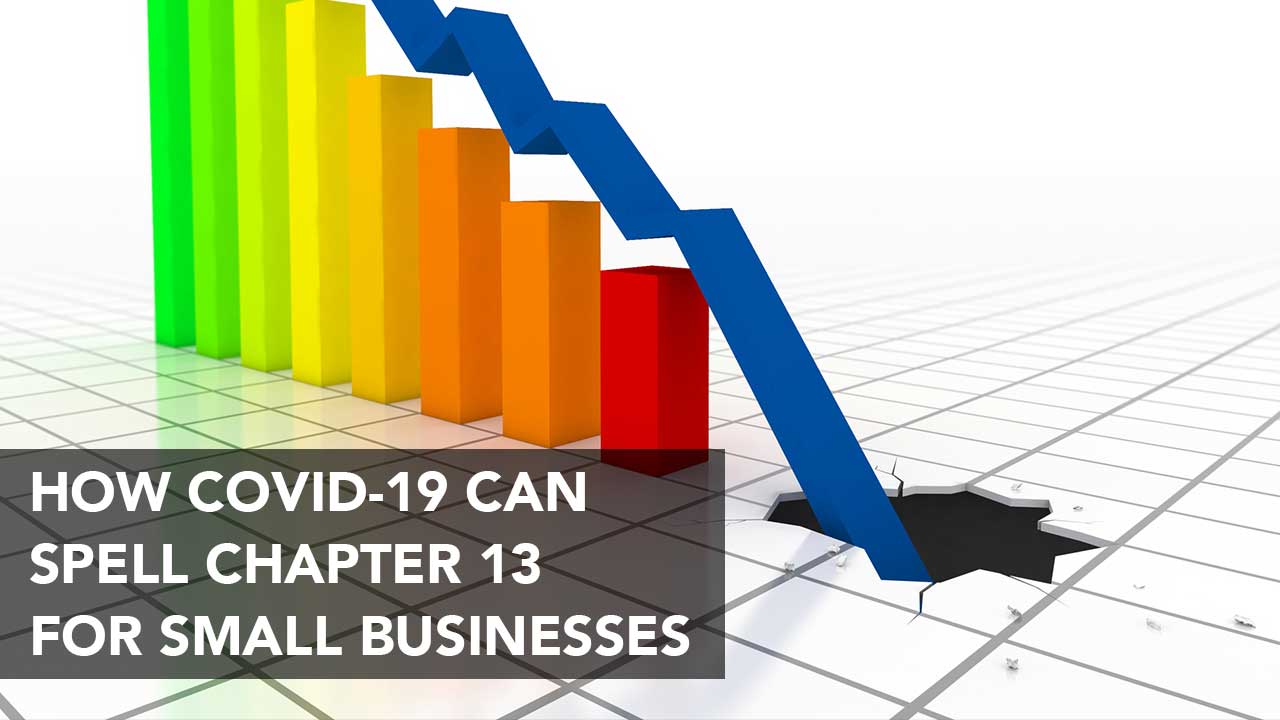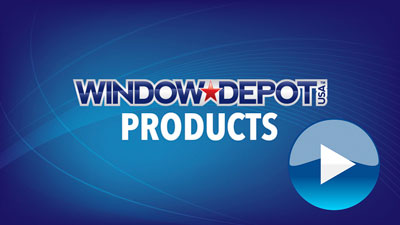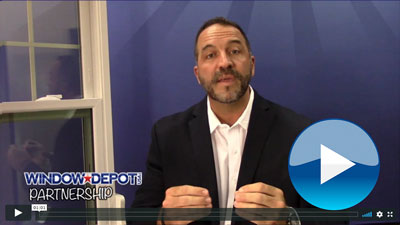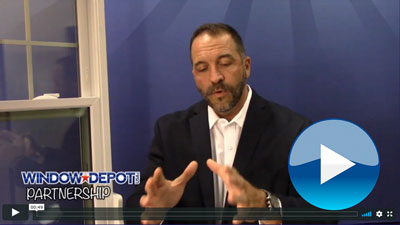
Here’s How COVID-19 can Cause Chapter 13 for Some Small Businesses
While the media is focused on the stock market, pointing out that companies have lost $4T (Trillion) in value in the last 10 days…some of us are over here like, “Hey, what about us? You know, small businesses.”
Did you know that 98% of the businesses in this country have fewer than 20 employees?
Small businesses are the bedrock of the American economy. They aren’t publicly traded entities with cash reserves and golden parachutes. They are businesses built by entrepreneurs and families, that operate on a scale that makes them much more vulnerable to calamities (especially ones that are sudden) like this new coronavirus.
Yeah…them. What about them?
What I’ve found is that most people don’t really understand just how fragile a small business can be. Heck, I don’t think most small business leaders understand just how fragile their businesses can be.
So today I felt compelled to give you an inside glimpse…at some of the financial fundamentals that drive small businesses, and more importantly, how those fundamentals can easily be disturbed, in a negative way.
But first…WHY? Why did I feel compelled to share this information? The answer, is audience specific.
To the Consumer: Your patronage keeps small businesses alive, and that in turn keeps all the families who depend on that business, alive. I hope that giving you some insight into small business financials might cause you to become more of a small business supporter, once we come out of this ‘weird’ time.
To the Small Business Employees: I hope that understanding a bit more about the pressure that your owners and managers are under, might make you a bit more empathetic…as your company does everything in its power to navigate this uncertain economic period.
And to the Small Business Leaders: If you aren’t intimately familiar with the concepts I’m about to discuss…then you’re doing a disservice to your team, your customers, your family and yourself. So listen up, understand the fragility of your business, and make the decision to emerge from this pandemic a stronger, more disciplined leader.
With all that said, let’s dive in a bit.
Or, you know what…let’s dive deep.
Let’s Start with Cash Flow
Everyone has heard this term, “cash flow”. And while it might seem obvious from the outside, it is more complex than it appears. And you know what they say… the Devil, is in the details.
Cash flow is the most important financial element of a small business. In simplest terms, if cash is going out, and NOT coming in…the business will eventually fail. And generally speaking, if more cash is coming in, than going out…the business should sustain, and hopefully ‘succeed’.
But here’s where the complexity comes into play. Incoming and outgoing cash (flow) isn’t always as simple as it appears. We see money going into a business when we pay…at the cash register, by sending a check or literally handing a business, cash. But there are some hidden (hidden to the consumer) variables that drastically affect how much cash the business actually gets.
First, “Cost of Goods Sold”.
You see…for every dollar a business receives, it must spend (or have spent) some amount of money to generate that sale.
When the hot dog shoppe sells you a hot dog, they first must purchase the hot dog, and the bun, and the chili, and that little paper tray.
Second, “Labor”.
This one seems pretty obvious, but while the hot dog entrepreneur might be back in the kitchen, working his weiner genius…someone has to be paid to work the front counter. And usually more.
Third, “Overhead”.
Overhead represents the expenses that a business must pay, regardless of how much is sold.
If the hot dog shoppe sells no hot dogs, they must still pay for the following:
- Rent
- The loan they took out to purchase that high-capacity stainless steel hot dog steamer
- Utilities
- Insurance
- Payroll from last week
- The advertising bill at the radio station
What happens, is that while the customer thinks he/she just gave the hot dog shoppe $5.00 for a hot dog…the owner actually receives something far less, because out of that $5.00, money was spent on goods, labor and overhead.
So here’s where I’m going to really open up the can of insight, and show you how a panicked and slowed economy can quickly have a devastating effect on small businesses.
Let’s End with Cash Flow
Have you been thinking about what “far less” means? Essentially what I’m referring to is profit. Profit is the amount of money the owner of the hot dog shoppe actually gets to take home, and literally feed his family with.
When you pay $5.00 at the hot dog shoppe, what do you think the profit is? Any guess?
Well, the average small business in North America makes 7%.
Yes, that $5.00 hot dog actually puts about 35 cents in the owners pocket, and that’s before taxes.
Now…7% is a blended average across industries. Hot Dogs provide a little more profit, per dog. But for sake of time and simplicity, let’s just round up to 10%.
And let me finally get to the point about an economic slowdown being dangerous for small businesses.
- For every five dollars that comes into the hot dog shoppe, $4.50 (90% of 5 bucks) is already “spoken for”. That 90% pays employees, landlords, advertisers and banks. All of these people are dependent on your hot dog purchase.
- If the owner of the hot dog shoppe sells a $5.00 hot dog, and makes 50 cents…then he or she must sell 100,000 hot dogs, to make $50,000 for his or her family (and that’s before taxes). Not exactly a King’s ransom. And typically, that profit is used for the owners family. There’s not a lot of excess cash saved for a ‘rainy day’.
What this illustrates is that many (if not most) small businesses operate with a profit that is smaller than you think. And with small percentage profits, comes vulnerability to downward swings in business.
It’s About The Timing
Think about it… If the hot dog shoppe loses 50% of its business overnight, how does the owner support his/her family on that reduced profit?
If the shoppe lost 50% of its business over an extended period of time, the owner would have some time to adjust and do things like:
- Layoff excess staff
- Reduce inventory of dogs and buns
- Reduce advertising spend
- Limit business hours
- Etc…
But when sales go down suddenly…there’s no time to react. Profits are instantly cut.
And you know what I’ve seen most entrepreneurs do, before they reduced staff, inventory, etc…? I’ve seen them sacrifice their own income, to make sure their employees are taken care of. This is often done by dipping into savings or retirement monies, which weakens that business’ ability to withstand a downturn in the future.
Small Businesses, Big Consequences
Even if a small business leader has cash saved up to survive a slow-down…how much is enough? Here’s the math, and here’s the illustration of the true vulnerability of this type of situation.
- We know that the owner of the hot dog shoppe needs to sell $500,000.00 per year, to make $50,000.00 and sustain their current family lifestyle.
- That means that each week requires about $10,000.00 in hot dog sales.
- If sales drop by half…the shoppe owner is $5,000.00 SHORT, each and every week.
So again, how much is enough? What if this virus scare lasts 3 months (12 weeks)? How many hot dog shoppes have $60,000.00 saved up to make up for the lost sales?
I’ll tell you: Not many.
There are things that any/all small businesses will do to cut expenses and “lean up”. But the sudden and unknown nature of this particular situation is a strain that’s going to challenge many of them.
So What Can Be Done?
To the Consumer:
- Keep spending. Everyone should exercise the recommended caution, that goes without saying. But consumers should simply understand that when they stop fueling the wheels of commerce…the ripples are broad.
- Stay positive, and understand that local businesses are far more dependent on your patronage than huge, publicly traded companies. They have employees too…I know, but they also have access to more cash, in order to sustain. Small businesses, local businesses, need you. And you need them.
To the Small Business Employees:
- Understand the risk that your employer is enduring every day.
- Have empathy for your leader.
- Treat this situation with urgency, but also with a genuine desire that the company will sustain for many years to come.
And to the Small Business Leaders:
- Keep things in perspective. I have not written this article to scare you by reminding you how thin your operating margins are… I’ve written it so that this trying time might shift your perspective, and that you might start looking at your financials a bit differently.
- Keep your team informed. Everyone who depends on your business is probably a little scared right now. Talk to them. Let them know that you’re in this together, and that you’re doing all you can to keep the customers coming.
- Keep your customers at the center of your strategy. These uncertain times are a genuine opportunity to connect with your customers on a deeper level. Communicate with them. Make sure they know how important they are.
- DECIDE. If you’re worried about cash flow, and your ability to sustain your overhead expenses while business is down…then DECIDE. DECIDE that you will never feel like this again. Start constructing your plan NOW.
I want someone to contact me, right now!
The right Products for your Market
Becoming a Window Depot USA dealer means access to high quality products, at nationally negotiated prices. Our motto of "National Strength, Local Service" isn't just a catch phrase. Imagine being able to offer homeowners in your area the very best value available, because of your acquisition price. Learn more about our products.
We're here to Support YOU
When you join Window Depot USA, you'll be supported by a strong corporate team that is vested in your success. We offer training and support in nearly every aspect of your business. From Marketing & Sales to Operations and Finance. We're here to help you succeed, at every level. Learn more about our Support.
The right PARTNERSHIP Approach
Window Depot USA is an official Licensing Program. What does that mean? It means that unlike a franchise, we don't charge huge up front fees, and we don't take a portion of your company profits. Instead, we act as a buying co-op...allowing you to put more money into your marketing, sales and bottom line. Learn more about our Approach.




